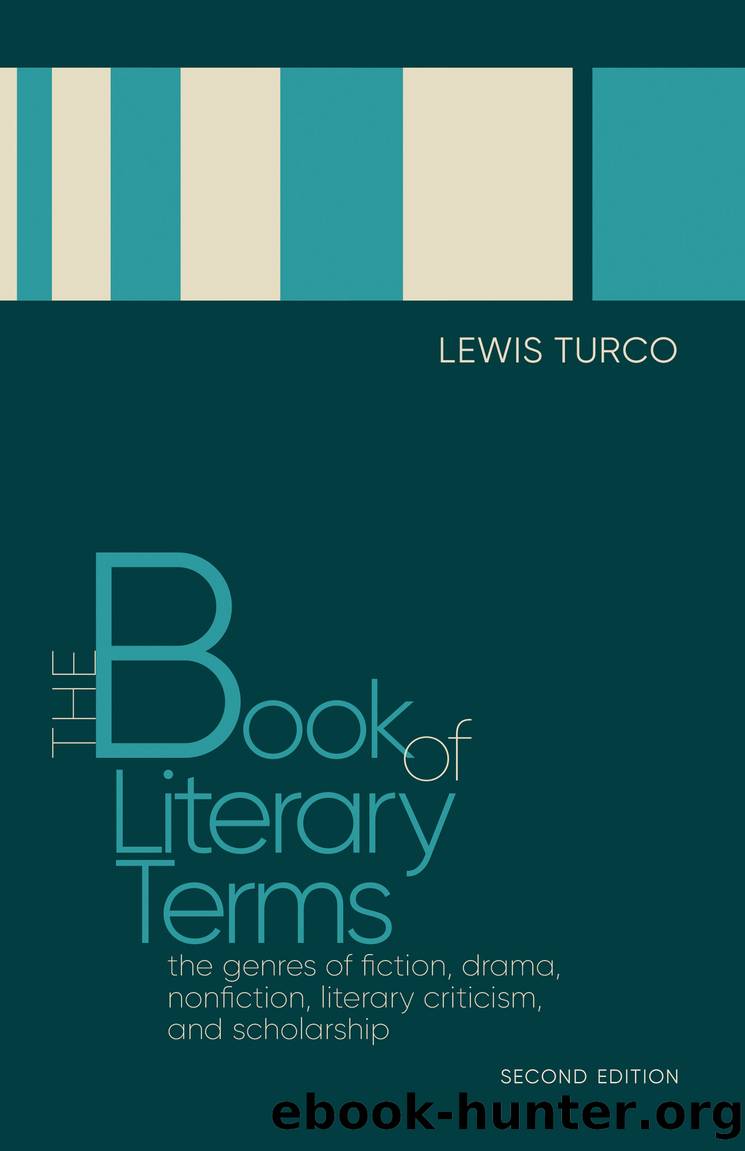Book of Literary Terms : The Genres of Fiction, Drama, Nonfiction, Literary Criticism, and Scholarship (9780826361936) by Turco Lewis

Author:Turco, Lewis
Language: eng
Format: epub
Publisher: Lightning Source Inc
Published: 2020-01-14T16:00:00+00:00
Dialogue
The primary means by which drama proceeds is through dialogue, which is conversation among the characters of the play. Dialogue in ancient Greek tragedy and poetry is sometimes arranged as stichomythia, the alternation of lines spoken by actors. A monologue is half of a conversation, a speech to a character who is presumed to be present, though a listener may not be evident to the audience, as for instance if the actor or actress on the stage is speaking into a telephone. A monodrama is, first, a dramatic monologue; second, a sequence of dramatic monologues by various characters who relate a story, as in the stage version of Edgar Lee Mastersâ (1869â1950) Spoon River; and, third, a one-man-show or theatrical presentation featuring only one actor. If the playwright wishes to convey directly to the audience an interior stateâthoughts or emotionsâhe or she must use the soliloquy or the asideâa remark, directed toward the audience, in a stage whisper loud enough for the audience to hear but, supposedly, not the other personae on stage. A soliloquy, sometimes called an interior monologue, is differentiated from a dramatic monologue in that it is personal thoughts verbalized rather than half a conversation; it is âtalking to oneself,â for no other audience is present or assumed to be present. However, those thoughts or feelings may be objectified in actions; for instance, if a character thinks she is ugly, after looking into a mirror she may break it angrily. âFor a complete disquisition on the subject of dialogue, see The Book of Dialogue, a companion volume of The Book of Literary Terms.â
Dialogue is indicated by means of a script which contains not only all of the dialogue of the play, but the actions and stage directions as well, and indications of the acts, scenes, sets and settings, placement and kind of props, stage business, and so forth. An antiplay is one that violates all the rules of drama, like those written for the theater of the absurd which is a mirror image of a traditional play.
In his trend-setting Six Characters in Search of an Author, the playwright Luigi Pirandello (1867â1936) has one of his personae, The Father, say at one point, âOh, Sir, you know well that life is full of infinite absurdities, which, strangely enough, do not even need to appear plausible, since they are true.â This speech puts into a capsule the philosophy of existentialism that is at the basis of much Modernist literature, including the so-called âtheatre of the absurdâ and âblack humor.â All of the things that are a part of the traditional theatreâall but one thingâare called into question. Traditional drama assumes, like all traditional literature, that there is a cause-and-effect relationship among the incidents of a plot and that this relationship gives the audience an accurate reflection of reality, what Aristotle called mimesis (imitatio), and what in the nineteenth century was called Realism. Thus, a character in fiction or drama has a dominant personality trait, desire, motivation, a problem to
Download
This site does not store any files on its server. We only index and link to content provided by other sites. Please contact the content providers to delete copyright contents if any and email us, we'll remove relevant links or contents immediately.
The Power of Myth by Joseph Campbell & Bill Moyers(1057)
Half Moon Bay by Jonathan Kellerman & Jesse Kellerman(979)
Inseparable by Emma Donoghue(976)
A Social History of the Media by Peter Burke & Peter Burke(972)
The Nets of Modernism: Henry James, Virginia Woolf, James Joyce, and Sigmund Freud by Maud Ellmann(891)
The Spike by Mark Humphries;(809)
The Complete Correspondence 1928-1940 by Theodor W. Adorno & Walter Benjamin(781)
A Theory of Narrative Drawing by Simon Grennan(774)
Culture by Terry Eagleton(770)
Ideology by Eagleton Terry;(731)
World Philology by(712)
Farnsworth's Classical English Rhetoric by Ward Farnsworth(711)
Bodies from the Library 3 by Tony Medawar(707)
Game of Thrones and Philosophy by William Irwin(707)
High Albania by M. Edith Durham(698)
Adam Smith by Jonathan Conlin(686)
A Reader’s Companion to J. D. Salinger’s The Catcher in the Rye by Peter Beidler(675)
Comic Genius: Portraits of Funny People by(649)
Monkey King by Wu Cheng'en(646)
